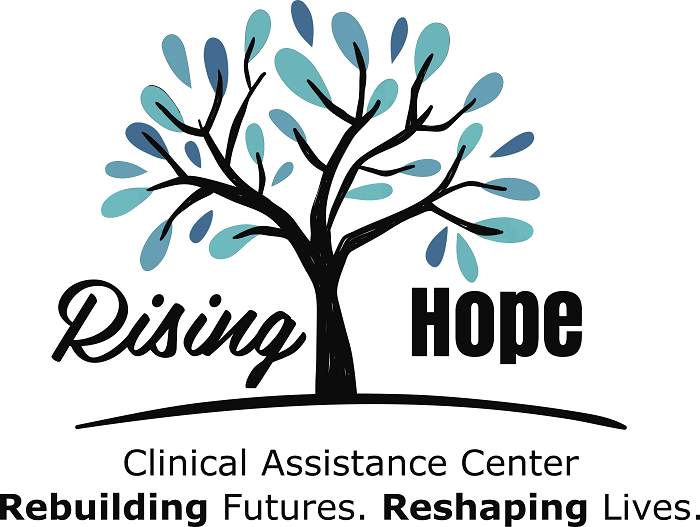Outpatient Therapy
Rising Hope offers numerous focuses on our outpatient therapy services. We specialize in serving individuals and families with mental illnesses, substance abuse issues, and trauma. Whether you need help managing a mental illness, want to strengthen your marriage, or just want to be a better you, Rising Hope is here to serve you and your family.
Our therapists are committed to helping you attain a better understanding of yourself, your goals, and your values. We give you the assistance you need in managing stress, improving your self-esteem, relationships, and confidence, leading to an overall healthier and happier life.
We provide family therapy, interpersonal therapy, group therapy, behavioral therapy, psychodynamic therapy, and cognitive therapy services.
Stress Management
Stress management is all about taking charge of your lifestyle, thoughts, emotions, and the way you deal with problems to lead a happier and healthier life. Many health issues are caused or contributed to by stress, so it is essential to understand how stress can affect your body and learn how to manage it. Common techniques for managing stress may include:
- Exercising regularly.
- Eating a healthy diet.
- Doing activities you enjoy.
- Rest and relaxation.
Anger Management
Anger management is the process of learning to recognize signs that you are becoming angry and taking action to calm down and deal with the situation in a productive manner. Rising Hope's therapists do not try to keep you from feeling anger or encourage you to hold it in.
While anger is a natural emotion, it can have a negative impact on the way people see you, impair your judgment, and get in the way of success. If you have an impulsive reaction to explode in times of anger, that can become harmful to yourself or others. It is beneficial to learn how to express this emotion more appropriately through anger management-focused therapy.
Proficiently managing anger takes practice. The good news is, the more you practice self-control, the easier it will get. The purpose of anger management is to help you achieve your goals, build better relationships, and live a happier and healthier life.
Our therapists often focus on the following aspects:
- Explore the underlying reason for your anger.
- Recognize your warning signs.
- Identify your triggers.
- Learn how to calm down in moments of anger.
- Find healthy ways to express your anger.
Mood Disorder Management
If you have a Mood Disorder such as Major Depression, your general emotional state or mood is distorted and interferes with your ability to function. You may be extremely sad, empty, or irritable. In other cases, you may have periods of depression alternating with being extremely happy, a sign of Bipolar Disorder.
Anxiety disorders can also affect your mood and often occur along with depression. Mood disorders may increase your risk of harming yourself or others.
Treatment will vary based on the specific illness and symptoms that are present. Usually, treatment involves a combination of medication and psychotherapy, also called "talk therapy," the latter of which we provide at Rising Hope.
Common mood disorders that we treat include:
- Major depressive disorder.
- Bipolar disorder.
- Seasonal affective disorder (SAD).
- Cyclothymic disorder.
- Premenstrual dysphoric disorder.
- Dysthymia: Persistent depressive disorder.
- Disruptive mood dysregulation disorder.
- Depression related to a medical ailment.
- Depression induced by substance use or medication.
Work-Life Balance
Work-life balance-focused therapy is about maintaining a separation between your work and your personal lives with proper prioritizing of your roles in each aspect.
Solution-Focused Therapy
Solution-focused therapy is often short-term and focuses on finding solutions to problems. This form of therapy focuses on what can be done in the present or future, rather than what has occurred in the past.
Mindfulness Therapy
Have you ever tried mindfulness? Mindfulness is a method of becoming more aware of yourself and your environment. You notice your thoughts, feelings, and physical sensations in a non-judgmental way. Rising Hope's experienced therapists will teach you how to practice mindfulness to promote holistic mental and physical health.
Clients with chronic pain, hypertension, heart disease, cancer, and other health issues such as anxiety and depression can greatly benefit from practicing mindfulness. Mindfulness-Based Cognitive Therapy, or MBCT, is a multi-faceted approach that aims to reduce stress, manage pain, and embrace the freedom to choose how to respond to life's challenges.
Motivational Interviewing
Motivational interviewing is a psychotherapeutic approach that seeks to move an individual away from a state of indecision or uncertainty. It guides individuals towards finding the motivation to make positive decisions and accomplish established goals.
This intervention helps people become motivated to change the behaviors that prevent them from making healthier choices. In motivational interviewing, the first goal is to increase the person's motivation, and the second goal is for the person to commit to change. Motivational interviewing is generally short-term counseling that requires just one or two sessions. It can also be included as an intervention along with other, longer-term therapies.
Mental Health Assessments and Evaluations
Having a mental health assessment gives your doctor a clear picture of the way you think, feel, reason, and remember. The mental health test assesses your emotional well-being through a series of questions.
Life can be difficult, and everyone goes through tough times. But being depressed, anxious, avoiding others, and having trouble thinking clearly may be more than the ups and downs most people feel now and then. If you notice that such symptoms impede your life or that of a loved one, it is crucial to take action. Getting the help you need early on can prevent symptoms from getting worse and will make a full recovery more likely.
Assessments to expect:
- Physical exam.
- Lab test.
- Mental health history.
- Personal history.
- Mental health evaluation.
- Cognitive evaluation.
Process addiction counseling
Process addiction, also known as a behavioral addiction, is a non-drug addiction characterized by a strong impulse to partake in a specific behavior. An individual with a process addiction engages in this behavior even when it results in harmful consequences to their emotional, interpersonal, or physical well-being. Our therapists can help you control your actions, keeping your decisions within your command.
With process addictions, the behaviors themselves provide a natural reward or emotional high. Behavioral addictions are fueled by compulsive behaviors that cause distress across areas of a person's life. Root causes and contributors may include trauma, attachment disorders, neglect, mental health disorders, and genetic history.
Common subjects of process addictions include shopping, eating, gambling, watching pornography, and other forms of sexual activity.
Family-Focused Forms of Therapy
Couples Therapy
Marriage Counseling, also known as Couples Therapy, typically brings couples or partners together for joint therapy sessions. With the assistance of a therapist, couples will learn skills and techniques to better their relationship, such as open communication and problem-solving.
Couples therapy changes the patterns that have made a negative impact on a couple's relationship and helps couples make decisions to ensure a happier and healthier relationship dynamic. Critical decisions include choosing to communicate more effectively to reconnect with your spouse, deciding to forgive infidelity, or choosing to amicably separate. The key is to learn and identify what those key patterns and issues are to improve your current relationship and not bring burdens into the future.
Common reasons couples go to counseling include loss of connection, communication problems, financial struggles, lack of intimacy, and parenting struggles.
Child Therapy
Child Therapy, also known as Play Therapy, focuses on the psychological needs of children. There are times when children need the assistance of a psychotherapist, and children's therapy can fulfill this need. Enabling children to engage in enjoyable activities expands self-expression, stimulates creative thinking and exploration, and connects children to others in a positive way.
Through play therapy, children are able to express their experiences or feelings more constructively, manage behavior, cope with stress and trauma, and experience a sense of well-being. Play therapists may work with children one-on-one or in small groups.
Forms of therapeutic play can include art, dance, storytelling, drama, visualization, and music. Play therapy is best suited for children between the ages of two and eleven. At the start of a session, the parents meet with the play therapist to share information. They also meet at the end of the session to learn about what was accomplished.
Family Therapy
We work with families attending therapy together to help them improve their communication skills, increase the positive aspects of their relationships, and repair the harmful or negative aspects. Rising Hope's therapists seek to reduce distress and conflict by improving the systems of interactions between family members, supporting their relationships.
Family therapy can help you improve troubled relationships between parents and children, siblings, or other family members. You may address specific issues such as marital or financial problems, a conflict between family members, or the impact of a member's substance abuse or mental illness on the family. Family therapy can be useful in any family situation that causes stress, grief, anger, or conflict. It can help you and your family members understand one another better and learn coping skills to strengthen your bonds.
Your family may want to pursue family therapy along with other types of mental health treatment, especially if one of you has a mental illness or addiction that also requires additional therapy or rehabilitation treatment.
Reach Out Today
Contact Rising Hope today to get started with therapy and begin your journey to wellness.




